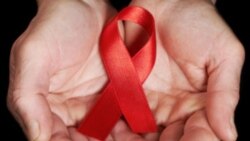Or download MP3 (Right-click or option-click and save link)
This is the VOA Special English Development Report.
International donors have promised almost twelve billion dollars to the Global Fund to Fight AIDS, Tuberculosis and Malaria.
The Global Fund held a two-day conference last week in New York. This is the largest pledge the eight-year-old organization has ever received. Stefan Emblad is the director of resource mobilization.
STEFAN EMBLAD: "Given the difficult economic climates and fiscal pressures that a number of donors are under, we achieved a significant increase over the last replenishment which was three years ago. We got a twenty percent increase in the contributions."
Still, the pledges were a billion dollars below the lowest estimate of the amount needed to fight the diseases effectively. In March, the Global Fund proposed three different plans, from thirteen to twenty billion dollars.
The Global Fund is a partnership of public and private organizations. This fund has become the main source of money for programs to treat and prevent AIDS, tuberculosis and malaria. Donations support programs in more than one hundred forty countries.
Nearly three million people are receiving treatment for the AIDS virus through Global Fund programs. One hundred forty-three million receive malaria drugs. And seven million new cases of TB have been diagnosed and treated since the fund began in two thousand two.
Global Fund officials estimate that their programs have saved more than five million lives. Stefan Emblad says these efforts will continue.
STEFAN EMBLAD: "It's important to know that we'll not be cutting funding to any of our existing programs and those programs will continue over the next few years to put more people on treatment, to have more prevention efforts, more care efforts as well. But they won't be at the same rapid pace that we've seen in the last two years."
Mr. Emblad says some of the Millennium Development Goals are still reachable with this new level of funding.
STEFAN EMBLAD: "We could eliminate malaria as a public health threat in malaria-endemic countries. We could also eliminate the transmission of HIV from pregnant mothers to their unborn babies. The countries themselves determine where they want to put the focus. If these two interventions are ones that they see as a priority, they can still be achieved by twenty fifteen."
More than forty donor countries, organizations and businesses attended last week's conference in New York.
The United States promised to give four billion dollars over the next three years, the largest donor pledge ever. The United States was the first donor to the fund and remains the largest. France is second, followed by Japan, Britain and Canada among the top five.
And that's the VOA Special English Development Report, written by June Simms. I'm Mario Ritter.



